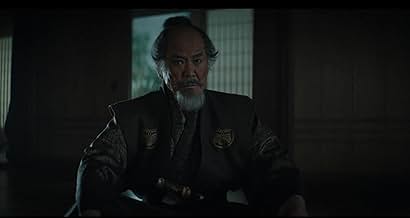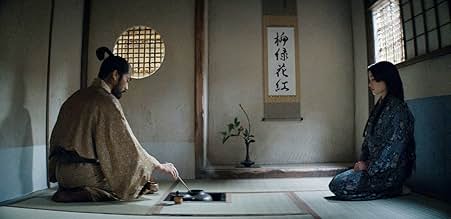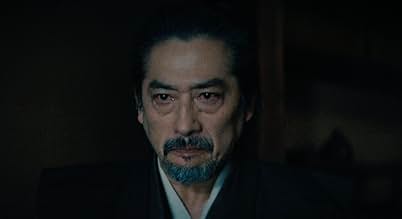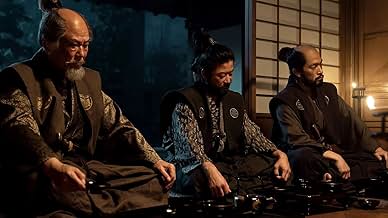Toranaga's defeated clan moves to Edo; Blackthorne must decide who he fights for.Toranaga's defeated clan moves to Edo; Blackthorne must decide who he fights for.Toranaga's defeated clan moves to Edo; Blackthorne must decide who he fights for.
Tatsuya Aoki
- Regal Buddhist Priest #1
- (as Reverend Tatsuya Aoki)
Featured reviews
10unkommon
While it has felt like the entire season to this point has been the proverbial "calm before the storm", "The Abyss of Life" truly was the silent calamity before the storm of storms we'll see in the final two episodes. But what a beautiful, tragic, heart wrenching silence it was.
The entire series up to this point has been pretty stellar - well acted, well written, and poignant as all hell - but this episode embodies exceptionally what it is about Shogun that makes it so... exceptional. Shogun, on its face, is a show about power, which it is, but more subtly is a show about power over - power over others, power over oneself, power over life and death, power over one's fate; or, really, powerlessness over all of the above. In the context of the story, there are machinations larger and more powerful than any one person, even Toranaga (as Hiramatsu showed), that would make even the most powerfully resolute fold like a towel. In the context of the metaphysical introspection that Shogun ponders, we are all powerless over something and, whatever it is and however it may manifest for us individually, accepting our place is the only rational approach. But as much as this series broaches our powerlessness, it also broaches how powerful we can be when fate bears us down like a ten-ton anchor. Toranaga, for all his scheming and apparent willingness to wade into the overwhelming current of fate, might be the most powerfully defiant of the fate laid out for him.
But this show is much more than a meta commentary on the designs of concepts residing in the furthest reaches of human philosophy, it is a visual masterpiece that often uses hushed and drab tones to underscore the dire and damned situation our main cast finds themselves. Subtly framed shots that capture the (emotional and spiritual) distance between those depicted are a wonderful touch of the masterful cinematography that ties together beautifully this masterwork of television. Every element is perfectly crafted and laid out to build the environment and tension and intrigue that elevate this work to the very highest echelons of the canon of television and cinema altogether. This episode is a marked moment for how powerful television can be and solidifies Shogun, for me, as one of the greatest shows of all time. I cannot wait to finish this incredible visual story. 9.5/10.
The entire series up to this point has been pretty stellar - well acted, well written, and poignant as all hell - but this episode embodies exceptionally what it is about Shogun that makes it so... exceptional. Shogun, on its face, is a show about power, which it is, but more subtly is a show about power over - power over others, power over oneself, power over life and death, power over one's fate; or, really, powerlessness over all of the above. In the context of the story, there are machinations larger and more powerful than any one person, even Toranaga (as Hiramatsu showed), that would make even the most powerfully resolute fold like a towel. In the context of the metaphysical introspection that Shogun ponders, we are all powerless over something and, whatever it is and however it may manifest for us individually, accepting our place is the only rational approach. But as much as this series broaches our powerlessness, it also broaches how powerful we can be when fate bears us down like a ten-ton anchor. Toranaga, for all his scheming and apparent willingness to wade into the overwhelming current of fate, might be the most powerfully defiant of the fate laid out for him.
But this show is much more than a meta commentary on the designs of concepts residing in the furthest reaches of human philosophy, it is a visual masterpiece that often uses hushed and drab tones to underscore the dire and damned situation our main cast finds themselves. Subtly framed shots that capture the (emotional and spiritual) distance between those depicted are a wonderful touch of the masterful cinematography that ties together beautifully this masterwork of television. Every element is perfectly crafted and laid out to build the environment and tension and intrigue that elevate this work to the very highest echelons of the canon of television and cinema altogether. This episode is a marked moment for how powerful television can be and solidifies Shogun, for me, as one of the greatest shows of all time. I cannot wait to finish this incredible visual story. 9.5/10.
Every Shogun episode raises the stakes higher and higher and there were zero moments waisted in this episode. The anticipation to find out what was to come felt like it was forever, but also sudden considering how much happened. So much weight was put into these scenes whether it was scheming, pleading, or a development between characters that left a broken bond, or rather a bond that had been broken over time. Certain goals seemed far out of reach after time went by, which lead characters down paths I did not expect. Blackthorne's next journey is going to be very interesting to watch, but that final sequence with Toranaga and Mariko was a great way to set up the final episodes and the story to come. I'm really glad Shogun puts more of an emphasis on building tension rather than weightless action sequences that could be flashy, but rather subpar without the lead up to them that add more meaning to the story. The slow chess game I think is what has made this show brilliant up until this point, and I'm confident that if or when the chaos ensues that it will be the perfect storm.
10ngkos
This episode's level of intrigue and subtlety about what's going on and what's going to happen is just off the charts.
Each and every one of the actors and actresses needed to give a 10 out of 10 performance to make the storyline believable to the audience and boy, they delivered all right.
This is the first time in a loooong time that I mumble phrases like "What have you done?", "Oh my god", "Ah Jesus...." when I am watching a television series or movie.
It is unbelievable television and I am actually sad that it has only 2 more episodes left.
Rachel Kondo and Justin Marks, can we get a second season, please?
Pretty please?
Oh, and to reviewer "osloj", after 8 episodes, you still do not understand why each character did what he/she did and also, Japanese culture in general?
Really... ?
I urge you to read "episode recap" articles for this Shogun episode and maybe, re-read your own review after that.
Hopefully, you would then realize how embarrassing your review really is.
Each and every one of the actors and actresses needed to give a 10 out of 10 performance to make the storyline believable to the audience and boy, they delivered all right.
This is the first time in a loooong time that I mumble phrases like "What have you done?", "Oh my god", "Ah Jesus...." when I am watching a television series or movie.
It is unbelievable television and I am actually sad that it has only 2 more episodes left.
Rachel Kondo and Justin Marks, can we get a second season, please?
Pretty please?
Oh, and to reviewer "osloj", after 8 episodes, you still do not understand why each character did what he/she did and also, Japanese culture in general?
Really... ?
I urge you to read "episode recap" articles for this Shogun episode and maybe, re-read your own review after that.
Hopefully, you would then realize how embarrassing your review really is.
In Episode 8 of Shogun, titled "The Abyss of Life," the series takes a deeply introspective turn, as characters grapple with personal loss, the burdens of duty, and the fragility of life. The episode centers on John Blackthorne (Richard Chamberlain) as he continues to navigate the treacherous political landscape of feudal Japan, while also coming to terms with his growing emotional ties to the people around him, particularly Lady Mariko (Yoko Shimada). The weight of the decisions he must make-both as a man and as a foreigner in a strange land-culminates in a series of powerful, emotionally charged moments that push him further into the heart of Japanese culture and philosophy.
The opening sequences of the episode immediately establish a somber tone, as Blackthorne witnesses the execution of a fellow European who failed to adapt to Japanese ways. This brutal act serves as a stark reminder of the harsh realities Blackthorne faces if he fails to conform to the social and political expectations imposed upon him. Chamberlain's performance is especially poignant here, conveying Blackthorne's inner conflict and fear as he questions his place in this foreign world. His subtle expressions and the way he absorbs the gravity of the situation provide a deeply human touch to the episode, emphasizing the psychological toll of his journey.
The episode's title, "The Abyss of Life," reflects the themes of existential crisis and moral dilemma that permeate the narrative. Characters are forced to confront the uncertainty of their fates, particularly as political alliances shift and the threat of war looms ever closer. Lord Toranaga (Toshiro Mifune) once again plays a key role, skillfully maneuvering the various factions around him while also testing Blackthorne's loyalty. Mifune's portrayal of Toranaga continues to impress, as he masterfully balances the character's pragmatic ruthlessness with moments of surprising vulnerability. One standout scene is a private conversation between Toranaga and Blackthorne, where the two discuss the impermanence of life-a philosophical exchange that highlights the cultural and personal divide between them.
Visually, the episode excels in capturing the beauty and austerity of the Japanese landscape, using nature as a backdrop to reflect the characters' inner turmoil. The cinematography makes excellent use of wide, sweeping shots of the Japanese countryside, juxtaposed against more intimate close-ups of the characters' faces. This visual contrast underscores the themes of isolation and connection, as characters seek meaning in a world that often feels indifferent to their personal struggles. The use of natural lighting-particularly during scenes set at dawn or dusk-adds a layer of emotional depth, casting long shadows over the characters and hinting at the darkness that looms in their futures.
However, while the episode is visually stunning and thematically rich, its pacing can be uneven at times. The slower, more contemplative moments-while essential for character development-occasionally drag, particularly in the middle of the episode. Some scenes could have benefitted from tighter editing, as the prolonged dialogues sometimes detract from the overall momentum. That said, these slower moments do provide crucial insight into the characters' motivations and fears, making them essential to the larger narrative, even if they momentarily disrupt the episode's rhythm.
One of the most memorable aspects of "The Abyss of Life" is its focus on the relationship between Blackthorne and Mariko. Yoko Shimada shines in her portrayal of Mariko, capturing the character's quiet strength and the deep emotional conflict she feels as a woman torn between duty and desire. The chemistry between Shimada and Chamberlain is palpable, particularly in the scenes where their characters share moments of vulnerability. The depth of their connection adds a layer of emotional complexity to the episode, as both characters are forced to confront the limits of their own power and agency within a rigid social hierarchy.
In conclusion, "The Abyss of Life" is a thought-provoking episode that delves into the moral and existential questions that have been bubbling beneath the surface throughout the series. The strong performances, particularly from Chamberlain and Shimada, anchor the episode's emotional core, while the philosophical exchanges between Blackthorne and Toranaga add intellectual depth. Despite some pacing issues, the episode succeeds in exploring the themes of life, death, and the human condition, all set against the backdrop of a world on the brink of chaos. As Shogun continues, it becomes clear that the show is not just a historical epic but a meditation on the complexities of human nature and the cultural collisions that define our shared history.
The opening sequences of the episode immediately establish a somber tone, as Blackthorne witnesses the execution of a fellow European who failed to adapt to Japanese ways. This brutal act serves as a stark reminder of the harsh realities Blackthorne faces if he fails to conform to the social and political expectations imposed upon him. Chamberlain's performance is especially poignant here, conveying Blackthorne's inner conflict and fear as he questions his place in this foreign world. His subtle expressions and the way he absorbs the gravity of the situation provide a deeply human touch to the episode, emphasizing the psychological toll of his journey.
The episode's title, "The Abyss of Life," reflects the themes of existential crisis and moral dilemma that permeate the narrative. Characters are forced to confront the uncertainty of their fates, particularly as political alliances shift and the threat of war looms ever closer. Lord Toranaga (Toshiro Mifune) once again plays a key role, skillfully maneuvering the various factions around him while also testing Blackthorne's loyalty. Mifune's portrayal of Toranaga continues to impress, as he masterfully balances the character's pragmatic ruthlessness with moments of surprising vulnerability. One standout scene is a private conversation between Toranaga and Blackthorne, where the two discuss the impermanence of life-a philosophical exchange that highlights the cultural and personal divide between them.
Visually, the episode excels in capturing the beauty and austerity of the Japanese landscape, using nature as a backdrop to reflect the characters' inner turmoil. The cinematography makes excellent use of wide, sweeping shots of the Japanese countryside, juxtaposed against more intimate close-ups of the characters' faces. This visual contrast underscores the themes of isolation and connection, as characters seek meaning in a world that often feels indifferent to their personal struggles. The use of natural lighting-particularly during scenes set at dawn or dusk-adds a layer of emotional depth, casting long shadows over the characters and hinting at the darkness that looms in their futures.
However, while the episode is visually stunning and thematically rich, its pacing can be uneven at times. The slower, more contemplative moments-while essential for character development-occasionally drag, particularly in the middle of the episode. Some scenes could have benefitted from tighter editing, as the prolonged dialogues sometimes detract from the overall momentum. That said, these slower moments do provide crucial insight into the characters' motivations and fears, making them essential to the larger narrative, even if they momentarily disrupt the episode's rhythm.
One of the most memorable aspects of "The Abyss of Life" is its focus on the relationship between Blackthorne and Mariko. Yoko Shimada shines in her portrayal of Mariko, capturing the character's quiet strength and the deep emotional conflict she feels as a woman torn between duty and desire. The chemistry between Shimada and Chamberlain is palpable, particularly in the scenes where their characters share moments of vulnerability. The depth of their connection adds a layer of emotional complexity to the episode, as both characters are forced to confront the limits of their own power and agency within a rigid social hierarchy.
In conclusion, "The Abyss of Life" is a thought-provoking episode that delves into the moral and existential questions that have been bubbling beneath the surface throughout the series. The strong performances, particularly from Chamberlain and Shimada, anchor the episode's emotional core, while the philosophical exchanges between Blackthorne and Toranaga add intellectual depth. Despite some pacing issues, the episode succeeds in exploring the themes of life, death, and the human condition, all set against the backdrop of a world on the brink of chaos. As Shogun continues, it becomes clear that the show is not just a historical epic but a meditation on the complexities of human nature and the cultural collisions that define our shared history.
10skw01
This movie is mind blowing, every episode can bring you deeper in to the line of this movie. It amaze me even more... so much wisdom , leadership, friendship, pain, tears , angry, motivated, past, future, determination, politic mindset,power,loyalty,pain,sacrifice,purpose,higher goal,strong mindset,strong character . All those relatable in real life. This movie succeeded extract exactly what feeling it's all about when we watch it. The art of war ancient Japan , the honor, you can see deeper the meaning of it . Whoever scripted this movie is a philosopher and once a great thinker. Not just like other movie! Thumbs up.
Did you know
- TriviaHiroyuki Sanada won an Emmy for his work in this episode.
- ConnectionsFeatured in The 76th Primetime Emmy Awards (2024)
- SoundtracksShinobi
performed by Atticus Ross, Leopold Ross & Nick Chuba
Details
- Runtime
- 58m
- Color
- Sound mix
- Aspect ratio
- 2.00 : 1
Contribute to this page
Suggest an edit or add missing content






























